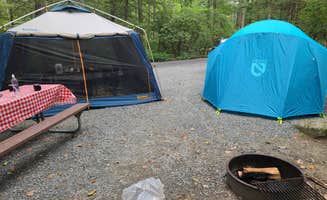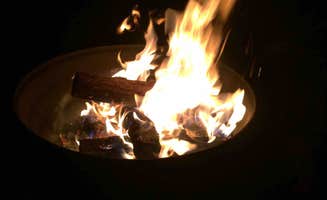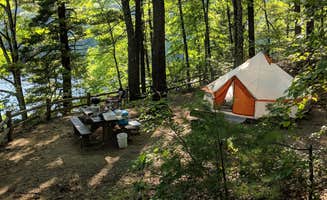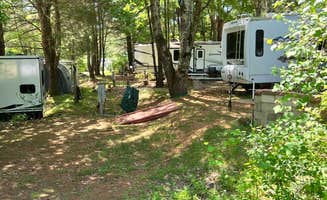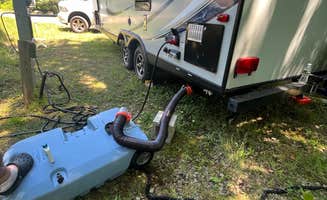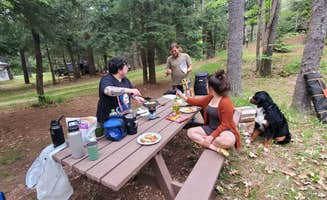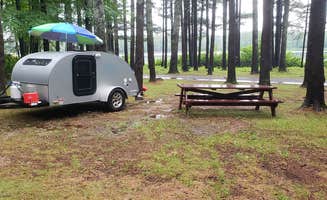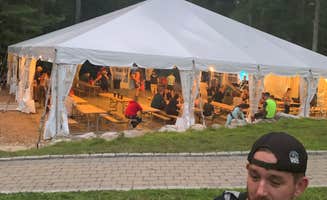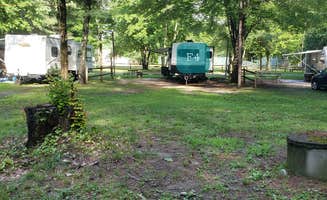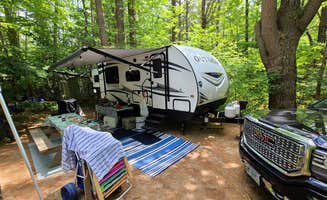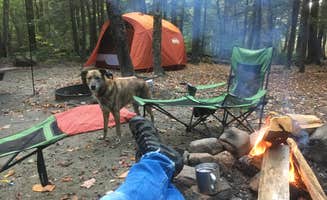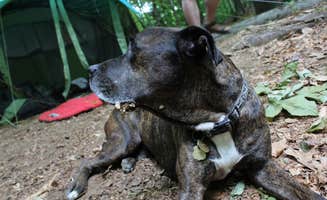The campgrounds near New Salem, Massachusetts spread across both sides of the Quabbin Reservoir, which serves as a 412-billion-gallon water supply for Boston. Most campsites sit between 800-1,200 feet elevation, creating cooler evening temperatures even during summer months. Local terrain ranges from gently rolling hills to steep rock outcroppings with numerous small lakes and ponds throughout the region.
What to do
Explore islands by kayak: At Tully Lake Recreation Area, paddlers can navigate around several small islands. "We take our canoe and spend the whole day at the lake. You can find lots of private areas to swim, pick blueberries and relax," notes camper Ben P. The lake offers many secluded spots perfect for swimming breaks.
Golf at nearby courses: Camp Coldbrook offers an on-site 9-hole course, though recent visitors report it needs maintenance. Better options exist within 15-20 minutes driving distance in surrounding towns, with greens fees typically ranging from $25-40. "The 9 hole course is more weeds than course. The greens have not been cared for in 10+ years," reports camper Glenn M.
Waterfall hunting: The region contains several waterfalls within short drives. Near Monadnock State Park, multiple cascades dot the hillsides. "There is an easy hike close to the entrance, along Doane's Falls, a series of 5 waterfalls along an ascending path through a wooded area," according to Nancy R. Most falls require less than a mile of hiking to reach.
What campers like
Cart-in camping privacy: Campers appreciate the vehicle-free environment at Tully Lake where sites must be reached by cart. "No cars at all at the campsites, which was great for peace of mind as our toddler roamed around. It also made for a super quiet stay," explains Megan G. The carts are provided by the campground, allowing gear transport without vehicles.
Clean facilities: Multiple campgrounds maintain well-kept bathrooms despite rustic settings. At Lake Dennison Recreation Area, "the sites were raked out and the fire pit was free of ash when we arrived," according to Nicole P. Bathroom cleaning schedules vary by campground but typically occur twice daily.
Geocaching opportunities: The Quabbin Reservoir area contains numerous geocaches, particularly around Federated Women's Club State Forest. "There are several along the entrance rd and in the area," notes Jean C. Download offline geocache maps before arrival as cell service is limited throughout the region.
What you should know
Limited cell service: Most campgrounds in the area have poor or non-existent mobile coverage. "Download your maps for offline use! Cell connection was horrible heading up here," warns Jean C. about Erving State Forest. Verizon typically has the best coverage, though still spotty. AT&T has usable signal at certain campgrounds: "Cell service was fine with AT&T," reports gabe N. at Lake Dennison.
Reservation requirements vary: Some campgrounds require advance booking while others operate first-come, first-served. Ashuelot River Campground requires reservations during peak season. "We spent another great weekend at the Ashuelot River Campground. We recently purchased a new-to-us camper and wanted to get in a trip or two before putting it away for the winter," mentions Rae-Ann W.
Seasonal considerations: Many campgrounds close entirely during winter months. Erving State Forest operates from "May 25 to October 8" according to their official season. Weather can change rapidly in the region, with overnight temperatures sometimes dropping below 50°F even during summer months.
Tips for camping with families
Playground access: Otter River State Forest offers facilities particularly good for younger children. "This campground is clean and well kept. Lots of families here. Swimming in a pond or a short drive to a bigger lake (camping pass covers both)," reports Lori-Ann D. The playground areas typically accommodate children under 12.
Insect preparation: Mosquitoes can be intense, especially at campgrounds near water. "Buggy in June so bring your repellent," advises Sa R. about Tully Lake. Sites at higher elevations typically have fewer insects than waterfront locations. Bringing screened shelters for eating areas is recommended during peak season.
Swimming options: Several campgrounds offer swimming beaches with varying amenities. Pine Acres Family Camping Resort features multiple swimming areas. "Perfect sized lake to swim and kayak," shares Emily H. about Lake Dennison's beach area. Most swimming areas lack lifeguards, so family supervision is required.
Tips from RVers
Site selection strategy: RV campers should research specific sites before booking. At Pine Acres Family Camping Resort, "A lot of sites are tight to get in. The lake beach could use a dredge so there is more sand (weedy)," warns Rick C. RVs longer than 30 feet may have difficulty at most state forest campgrounds.
Electrical concerns: Some campgrounds have reported electrical system issues. At Camp Coldbrook, one camper noted, "The electrical system has claimed countless RV components and 2 total losses. Instead of fixing it, they simply run generators for years." Bringing a surge protector is strongly recommended for all hookup sites.
Covered bridge awareness: When traveling to campgrounds near the New Hampshire border, be aware of low clearance bridges. "Highly suggest reading the directions on the campgrounds website about the covered bridge you're not allowed to cross - we discovered this the hard way," cautions Mallory P. about accessing Ashuelot River Campground. Some bridges have height restrictions as low as 7'6".


